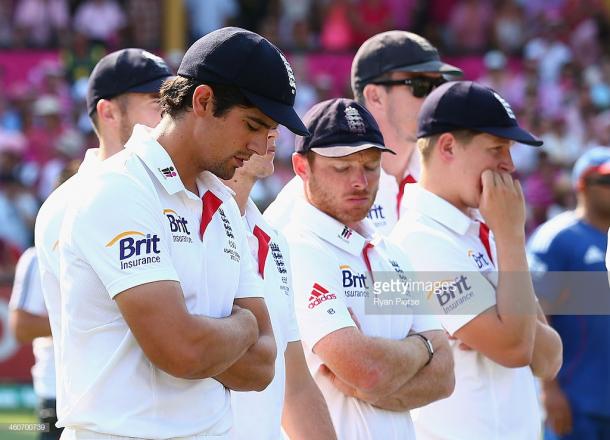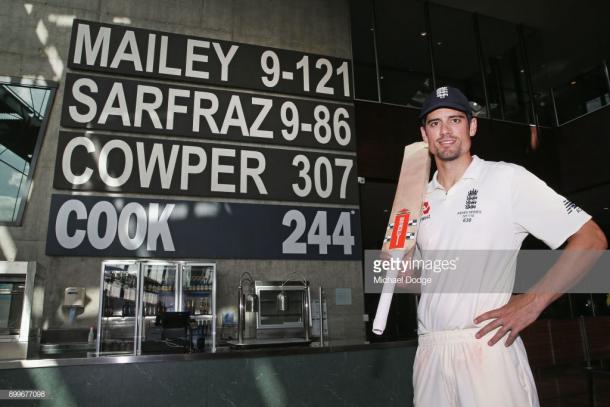England batsman Alastair Cook has announced he will step down from international cricket upon the completion of the fifth Test match against India at The Oval.
The 33-year-old has been a mainstay at the top of the order for the past twelve years and has broken several records during his time on the world stage. He has scored the most Test runs (12,254), centuries (32) and holds the most caps (160) by an Englishman - including a run of 158 consecutive matches dating all the way back to 2006. His aggregate of runs is also bettered by only five men in history.
During his time in the limited-overs side, he also contributed 3204 runs at an average of 36.40 in 92 one-day internationals.

From teenage prodigy to legend of the game
Having been drafted into the squad at the eleventh hour to replace the injured Michael Vaughan for the first match of the series against India in Nagpur twelve years ago, the Essex man lived up to the hype that was surrounding the then 21-year-old as he hit an unbeaten 104 in the second innings to secure a draw for his side.
That was enough to confirm his place at the top of the order alongside Andrew Strauss, and from then on the two left-handers formed a sterling partnership that would blossom for the forthcoming six years until Strauss' retirement. They notched 4,711 runs together - the most by any English opening pair and the third-most successful in cricketing history.
The two were crucial cogs in the wheel that saw England win back-to-back Ashes series' - including the first in Australia for 24 years, in the winter of 2010/11. Cook, in particular, was in the form of his life during that spell Down Under with 766 runs at an average of 127.66.
He helped England to rise to number one in the Test rankings following a ruthless 4-0 dispatch of India in the summer of 2011, a series in which he produced his highest ever score in Tests - a mammoth 294 at Edgbaston.

Captaincy brings glorious highs and devastating lows
Following Strauss' well-documented retirement from the international fold late in 2012 Cook took on the captaincy, his inaugural series being away in India - and so he embarked on what was an oscillating period at the head of the team.
With question marks being raised as to whether the burden of being leader would affect his form with bat in hand, he answered the question emphatically, racking up 562 runs in the four matches - including three hundreds - as he was named Player of the Series, becoming the first England captain to reign victorious in the subcontinental nation for 27 years.
A first Ashes success as captain was secured that following summer, however fast-forward five months from that victory and Cook surely reached his nadir, with the treacherous whitewash in Australia - which had of course been the setting for his all-conquering spell just three years earlier. As expected following such an embarrassing result, there were serious questions asked as to his capability as leader.
Alas, he displayed the mental toughness and resilience that he has become well known for and did not relinquish the title, instead leading the side to a 3-1 victory over India in home conditions. And it was this series that saw him play arguably his most pressurised knock in an England shirt.
In the midst of a barren run of 27 innings' without a century, with calls bombarding him to step down as captain and the side 0-1 behind after two matches, Cook battled, fought and displayed all of his never-say-die attitude when at the crease to hit 95 in the third Test at the Ageas Bowl to tie the score at 1-1 with two matches left to play.
He may have fallen agonisingly short of those illustrious three figures, but his efforts were duly rewarded with a standing ovation from the Southampton crowd upon his dismissal.
2015 saw a second home victory over Australia as captain, and also an 896-minute long innings in the sweltering desert heat of Abu Dhabi as he hit 263, one in which his infamous ability as the Man Who Does Not Sweat came in handy. A 2-1 triumph away in South Africa was also secured.

Content with return to the ranks
Yet, having seen his side humbled 4-0 away in India during late 2016, Cook made the courageous decision to step down from the pedestal of leader after 59 matches (another English record) and return to the ranks as a foot soldier, passing the baton to Joe Root instead.
Worn down by the perpetual psychological strains of captaincy, Cook was more than happy to stand at first slip - increasing his current record of 173 catches, the sixth-most in Test history - and focus purely on his batting.
His record in recent times has not been what he or England fans would have wanted, and following struggles first against the West Indies last year and then on the recent tour of the Antipodes he has two startling anomalies in those lean times: two double hundreds. 243 against the men from the Caribbean and 244 at the MCG in the Boxing Day Test, the highest individual score ever hit by a travelling batsman at the historic old venue.
He has passed 50 only once since that mammoth innings in Melbourne though and recognises that now is the correct time to bow out, with his head firmly held high.
In today's cricketing culture of brash, loud, explosive activities Cook is a heart-warming irregularity. Quiet. Unassuming. Understated. His genius lies not in his strike rate; not in his ability to clear the ropes; but his nudging, his nurdling, his overwhelming ability to grind down bowlers with sheer bloody-mindedness.
He may not have collected the numbers he wanted recently, but he has showed in the past twelve months that even if he is in the midst of an under-productive spell he can turn that on its head and produce one of the Herculean innings' he has become associated with. India, relax at your peril.
There will be millions willing on 'Chef' to produce one last colossal knock as he brings down the curtain on his time in the spotlight. For a bona fide legend of cricket, there could be no better ending.









































